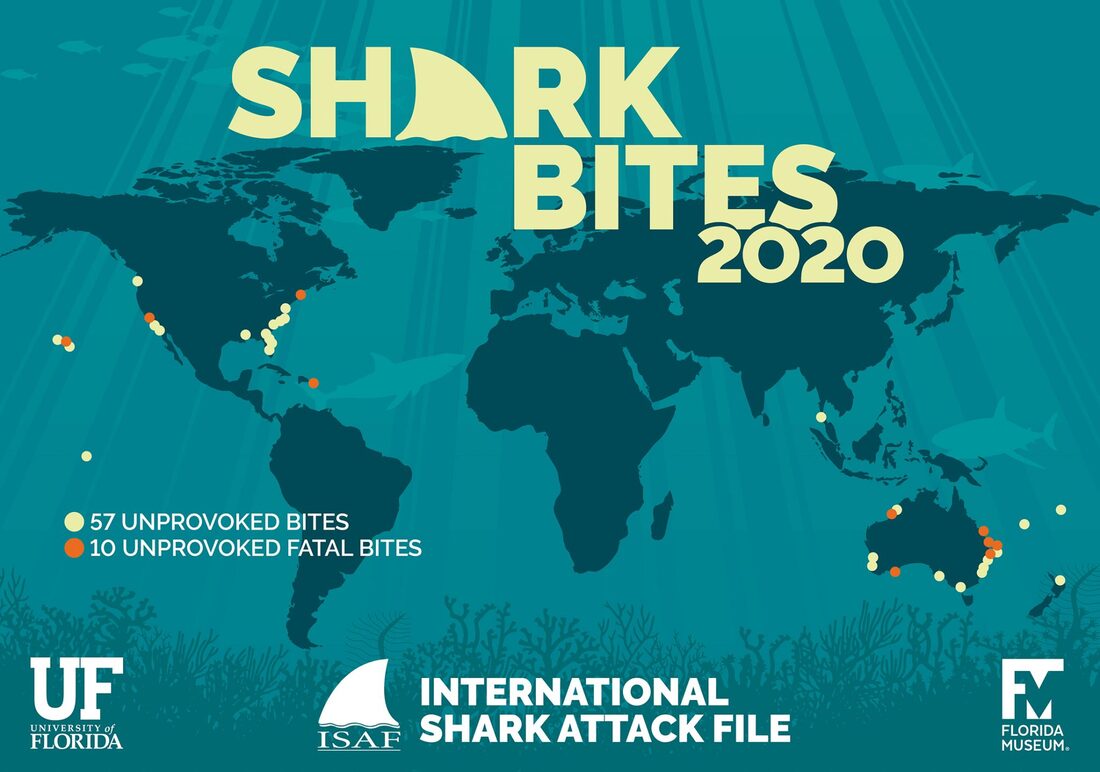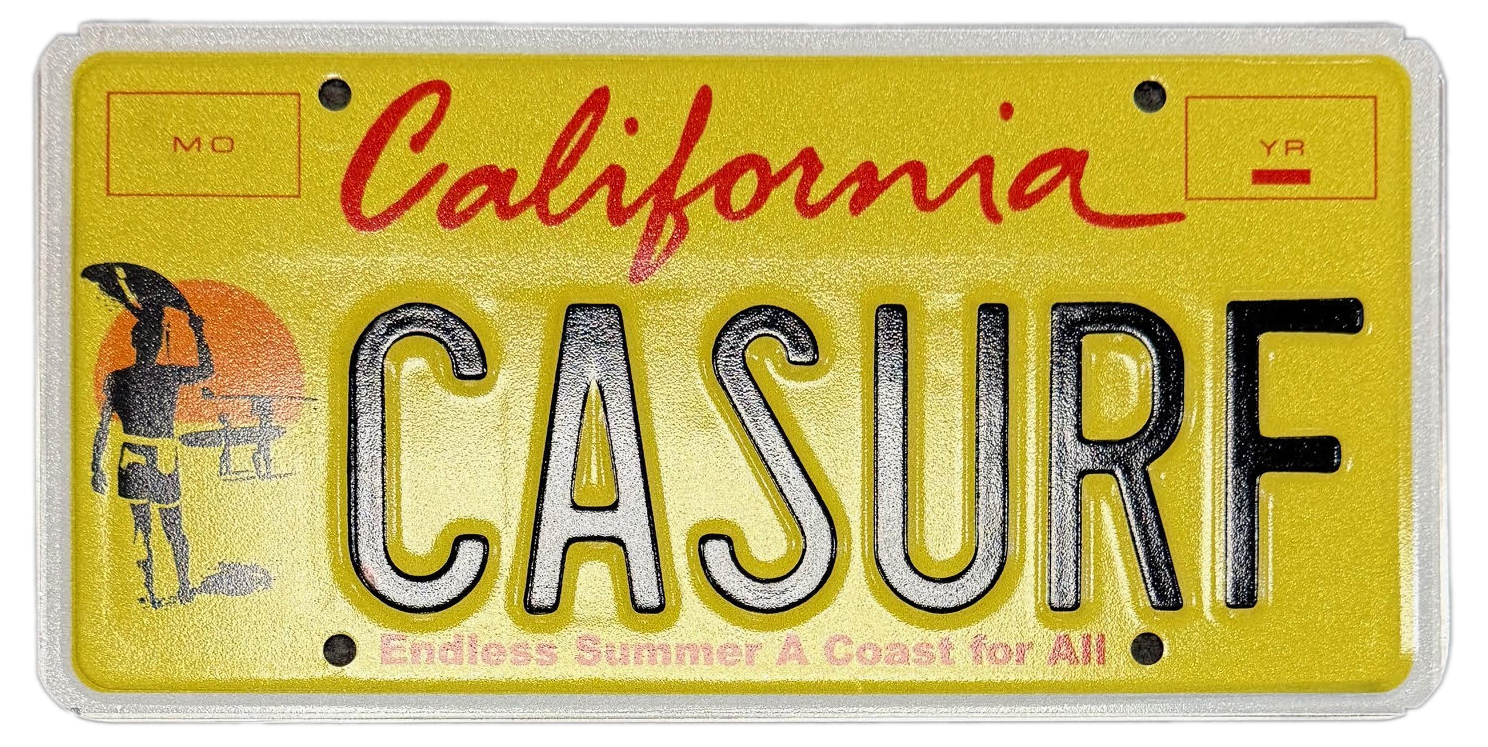|
Shark attacks decreased for the third consecutive year, falling to 57 unprovoked bites worldwide in 2020, compared with 64 bites in 2019 and 66 in 2018, according to the annual summary issued by the University of Florida’s International Shark Attack File. The most recent five-year global average sank to 80 incidents annually. But it was the deadliest year since 2013, with 10 unprovoked bites resulting in fatalities, a stark departure from the average of four per year. Six of the fatal bites occurred in Australia, three in the U.S. and one in the waters of St. Martin in the Caribbean. Consistent with long-term trends, the United States led the world in the number of bites, with 33 incidents, a 19.5% drop from 41 last year. Australia followed with 18, a slight uptick from the country’s most recent five-year average of 16 bites per year. Gavin Naylor, director of the Florida Museum of Natural History’s shark research program, said the high number of deaths in 2020 is likely an anomaly. “It’s a dramatic spike, but it’s not yet cause for alarm,” he said. “We expect some year-to-year variability in bite numbers and fatalities. One year does not make a trend. 2020′s total bite count is extremely low, and long-term data show the number of fatal bites is decreasing over time.” Experts also confirmed single, non-fatal bites in the Republic of Fiji, French Polynesia, New Caledonia, New Zealand and Thailand. ISAF investigates all human-shark interactions but focuses its report on unprovoked attacks, which are initiated by a shark in its natural habitat with no human provocation. These exclude bites to boats, scavenging and bites in public aquariums. The past three years have marked an abrupt drop in global shark attacks from previous totals in the high 80s. 2017′s 88 unprovoked bites, for example, were average at the time. Still, 2020′s total of 57 bites worldwide represents a larger-than-expected decrease from 2019 and 2018, Naylor said. It remains unclear whether COVID-19 lockdowns and a slow year for tourism might have contributed to an unusually low number of bites – or if the dip reflects the challenges of getting data during a pandemic. While a certain number of cases remain unconfirmed and unclassified each year, this situation was exacerbated in 2020, said Tyler Bowling, ISAF manager. With law enforcement, coroners and healthcare workers focused on responding to COVID-19, few had time to help confirm reported shark bites or provide extra information about incidents. As a result, Bowling is still working to confirm 16 reported bites and classify an additional six confirmed bites as unprovoked or provoked. In contrast, nine incidents were unconfirmed in 2019 and nine were confirmed as shark bites but could not be classified. All open cases remain under investigation, Bowling said. Surfers and other board sport athletes, largely undeterred by the pandemic, experienced 61% of bites worldwide in 2020, compared with 53% in 2019 and 2018. With 1,350 miles of coastline and a large surfing community, Florida has long been a global hotspot for shark bites, a trend that continued in 2020. The state’s 16 unprovoked bites accounted for about 48% of the U.S. total and 28% of incidents worldwide, though the total was significantly lower than Florida’s five-year annual average of 30.
Eight of the bites happened in Volusia County, followed by three in Brevard and single attacks in Duval, Martin, Miami-Dade, Palm Beach and St. Johns counties. Other states with unprovoked bites include Hawaii, 5, California, 4, and North Carolina, 3, with single incidents in Alabama, Delaware, Maine, Oregon and South Carolina. Three of the bites proved fatal, one each in California, Hawaii and Maine, a first for the state.
0 Comments
Surf fans will have to wait longer to cheer for their favorite pro surfer, with upcoming contests in Hawaii and Northern California affected by coronavirus concerns. The World Surf League announced it has cancelled the Sunset Open and is postponing for now a new event in Santa Cruz. The news follows a short, but shaky, start of the pro surfing season with the Billabong Pipe Masters having to be paused following staff members testing positive for coronavirus. The event was allowed to eventually finish. The women’s event, the Maui Pro, had to change venues after a shark attack on a recreational surfer near the contest site. Hawaii suspended all surfing competitions until further notice, the WSL, which is based in Santa Monica, announced. The Sunset Open was supposed to happen between Jan. 19 and 28. The Big Wave Jaws Championship Pe’ahi has also been canceled. With the ongoing surge in California cases, the WSL has postponed the Santa Cruz Pro, which would have run Feb. 2 through 12. “The decision to postpone the Santa Cruz Pro, the last planned event of the US leg of the Championship Tour, is based primarily on the surge of COVID-19 cases in California,” league officials said. “The postponement is also heavily influenced by the length of time our athletes have been away from home, and by the complexities of global travel during this pandemic, which would have caused significant logistical challenges for athletes and staff to travel home and return to California for the event.” The Sunset Open in Hawaii would have been the first time a men and women’s championship title was held there since 1991. It has also been about three decades since the world’s best competed at Steamer Lane in Santa Cruz. “It is a testament to our surfers, staff and the local community of Hawaii that we were able to successfully complete both the men’s and women’s opening (competition tour) events of the 2021 season, and we would like to thank the communities in both Maui and Oahu for their support,” the announcement said. Still on the schedule is the Australian leg, kicking off with the Rip Curl Pro Bells Beach contest in April. The World Surf League previously announced many changes to this year’s tour, including bringing professional surfing back to Lower Trestles, one of the mainland’s best spots for waves, for the first time in three years since the Hurley Pro was last held there. It swapped for an event at the Surf Ranch, a man-made wave pool in Lemoore, near Fresno.
The Lower Trestles event is still planned, though it will depend on the state of the pandemic. The event south of San Clemente will bring together the top five men and top five women for the new surf-off format at the high-performance wave. The WSL Finals will have a window from Sept. 8 to 17, with the contest to run on the day with the best surf conditions. Endless Summer has now surpassed the University of Florida as the top selling specialty license plate in Florida, notwithstanding generating slightly less revenue this year compared to 2019, due to the Covid-19 pandemic. Showing that specialty license plates continue to generate revenue for worthy causes, despite the pandemic - raising over $32 million in 2020.
Miami Heat and Tampa Bay Bucs both increased their sales and revenue in 2020, the only two specialty plates to do so in the Top 10. So far in the 2021 Florida State Legislative Session, 7 new specialty plates have been proposed and bills have been filed for the following: Explore our State Parks - Rep Allison Tant (D-Leon County) / Senator Dennis Baxley R-Lady Lake Inter Miami CF - Senator Manny Diaz (R-Hialeah Gardens) Toastmasters - Senator Linda Stewart (D-Orlando) Gopher Tortoise - Senator Linda Stewart (D-Orlando) Orlando United - Senator Linda Stewart (D-Orlando) Protect Wild Dolphins Alliance - Rep Jim Mooney (R-Florida Keys) Honor Flight - Rep Brett Thomas Gage (R-Sumter County) The state is also in the process of completing presale voucher requirements for 32 new plates, which commenced in October, 2019. The surfing industry is seeing a boom in business during the COVID-19 pandemic.
One place where business has boomed is at Drill Malibu Surf and Skate. Craig Clunies-Ross said he and his staff will be riding the surf frenzy wave as long as they can. "It's exploding," Clunies-Ross said. The shop owner said surf lessons and board and wetsuit sales have quadrupled. "People are chasing the delivery truck to our shop and there's a line before we can even get them off the delivery truck," employee Christian Pflaum said. After losing both his homes to the Woolsey Fire in 2018, the Malibu business owner thought his luck was turning around in the spring. "We felt like we'd really righted the ship and got things back to normal and then the pandemic hit this spring," Clunies-Ross said. Clunies-Ross was forced to shut his doors for a few months, but with the pandemic pushing most outdoors, people want to hit the water. "I was just stuck in my apartment all day. I'm a musician. I've been working from home and I just wasn't getting outside, so I'd always been thinking about it and just decided to teach myself," surfer Sam Saunders said. "During COVID, there's not as many ways to be social or be in a community and so for me, surfing has kind of become that way to just connect and just to be around people," surfer Mattie Peña said. "As stores started to open up and down the California coast, the demand got crazy and companies like O'Neill wetsuits, Catch Surf, Storm Blade, Rip Curl - they started running out of product because stores like mine were seeing elevated business," Clunies-Ross said. "Before, we would do one-time lessons for first-time tourists who just want to get the California scene. Now, it's more like surf coaching and surf training with people that are renting the beach houses in this area, so we'll have clients that'll stick around for months with us," Pflaum said. Clunies-Ross said sales have been record-breaking in September. He's on his way to his best year since opening his shop in 2009. |
blogArchives
May 2025
Categories
All
|
Funding from this plate will be directed to programs that promote coastal access, make coastal lands welcoming to all, and increase opportunities for coastal enjoyment.





